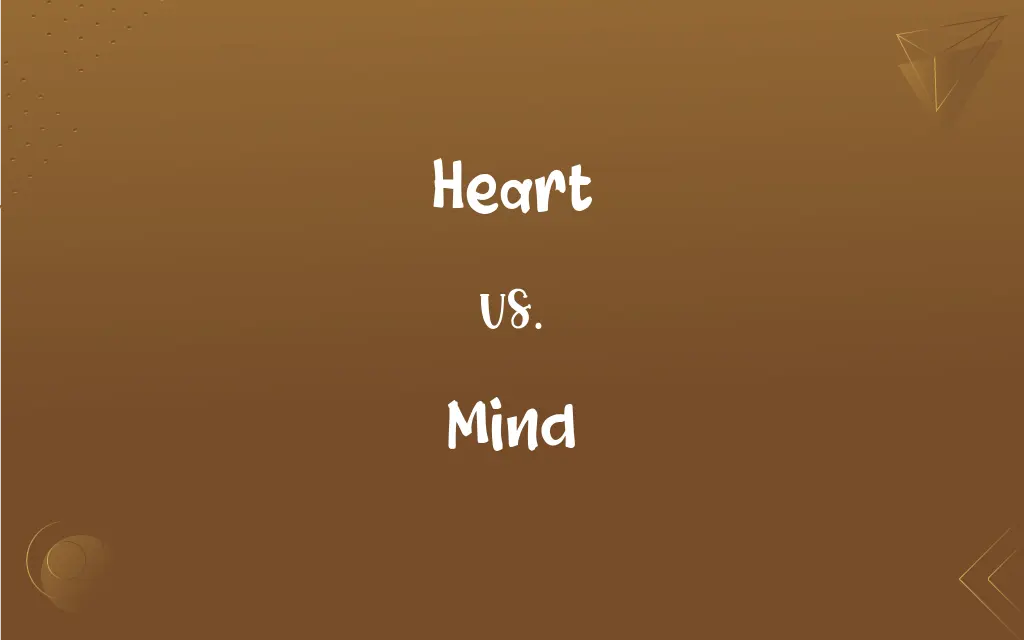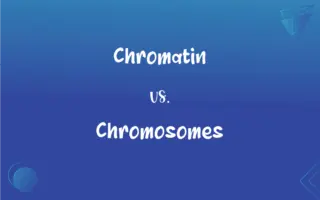Heart vs. Mind: What's the Difference?
Edited by Janet White || By Harlon Moss || Updated on July 5, 2024
The heart is a vital organ pumping blood, while the mind is the seat of consciousness, thought, and emotion.

Key Differences
The heart and mind, both essential to human existence, serve distinct roles in physiology and metaphorically in human experience. The heart, primarily, is a muscular organ responsible for circulating blood throughout the body. It ensures that vital nutrients and oxygen reach various cells and organs. Conversely, the mind, though not a physical organ like the heart, is commonly associated with the brain's functions. It encompasses thoughts, emotions, memories, and the overarching consciousness.
On a metaphorical level, the heart often symbolizes emotions, love, and passion. Phrases like "follow your heart" or "heartfelt gratitude" allude to deep emotions or desires. It's a symbol that transcends cultures, often denoting love, courage, or sincerity.
In comparison, the mind symbolically represents logic, reason, and intellect. When one says they've changed their "mind" about something, they mean their perspective or decision has been altered, typically after some reflection or reasoning. In debates between emotion and logic, the heart and mind often find themselves pitted against each other, symbolizing the eternal tussle between feelings and rational thought.
Comparison Chart
Physical Entity
Yes, a muscular organ
No, but associated with the brain
Symbolic Meaning
Emotions, love, courage
Intellect, reason, consciousness
ADVERTISEMENT
Function
Pumps blood throughout the body
Seat of thoughts, emotions, decisions
Associated Phrases
"Heartfelt", "broken heart"
"Mind over matter", "open-minded"
Cultural Reference
Universally symbolizes love & passion
Often denotes intellect & rational thought
Heart and Mind Definitions
Heart
A muscular organ pumping blood.
The heart supplies oxygenated blood to the body.
Mind
The element of a person processing thoughts and consciousness.
His mind is always buzzing with new ideas.
ADVERTISEMENT
Heart
Courage or enthusiasm.
She showed great heart in the competition.
Mind
Memory or recollection.
That song brings to mind our summer vacation.
Heart
The central or most important part.
The city's park is the heart of the community.
Mind
Intention or inclination.
I have a mind to complete this task by tomorrow.
Heart
Compassion or generosity.
She has a heart of gold, always helping others.
Mind
A person's intellect or understanding.
She has one of the sharpest minds in the industry.
Heart
One's mood or feeling.
He had a change of heart after hearing her story.
Mind
Opinion or view.
Speak your mind and let us know what you think.
Heart
The chambered muscular organ in vertebrates that pumps blood received from the veins into the arteries, thereby maintaining the flow of blood through the entire circulatory system.
Mind
The faculty of a human or other animal by which it thinks, perceives, feels, remembers, or desires
Studying the relation between the brain and the mind.
Heart
A similarly functioning structure in invertebrates.
Mind
A person of great mental ability
The great minds of the century.
FAQs
Can the heart think like the mind?
No, the heart cannot think; it's a muscular organ.
Is the brain the same as the mind?
The brain is a physical organ, while the mind refers to consciousness and thought processes.
Is the heart responsible for emotions?
While symbolically linked to emotions, the heart's primary function is to pump blood.
What does "make up one's mind" mean?
It means to come to a decision or conclusion.
Can the mind influence physical health?
Yes, mental states like stress can impact physical well-being.
Why do people give heart-shaped gifts?
Heart shapes symbolically represent love and affection.
Why do people say "listen to your heart"?
It's a metaphorical way of suggesting one follow their emotions or intuition.
How does the heart relate to circulation?
The heart pumps blood, ensuring circulation throughout the body.
What is "mindfulness"?
It's a mental state focusing on the present moment, often used in meditation.
Can the mind be trained?
Yes, through techniques like meditation or cognitive training.
What does "heartfelt" mean?
It means deeply or sincerely felt.
How does the mind form memories?
The mind, through the brain's processes, encodes, stores, and recalls information.
How many chambers does the heart have?
The human heart has four chambers.
Why is the heart symbolized as love?
It's a cultural and historical association of the heart with emotions and life.
Can you live without a heart?
No, the heart is vital for circulating blood and sustaining life.
Is the mind tangible?
No, the mind is intangible, but it's associated with the brain's functions.
Can the mind exist without the brain?
Current understanding links the mind's functions to the brain, so they are interdependent.
What does the mind process?
The mind processes thoughts, emotions, and memories.
What does "open-minded" mean?
It means being receptive to new ideas or perspectives.
Is heart disease related to emotions?
While stress can contribute, heart disease primarily concerns physical factors.
About Author
Written by
Harlon MossHarlon is a seasoned quality moderator and accomplished content writer for Difference Wiki. An alumnus of the prestigious University of California, he earned his degree in Computer Science. Leveraging his academic background, Harlon brings a meticulous and informed perspective to his work, ensuring content accuracy and excellence.
Edited by
Janet WhiteJanet White has been an esteemed writer and blogger for Difference Wiki. Holding a Master's degree in Science and Medical Journalism from the prestigious Boston University, she has consistently demonstrated her expertise and passion for her field. When she's not immersed in her work, Janet relishes her time exercising, delving into a good book, and cherishing moments with friends and family.































































